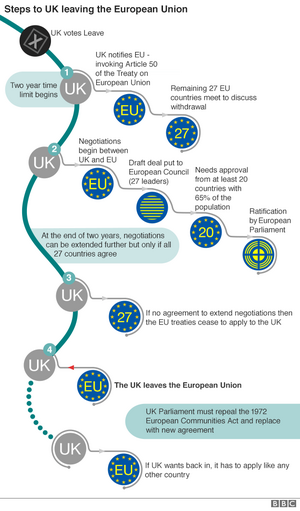Brexit talks role for Belgian EU veteran Guy Verhofstadt
A veteran European federalist, Belgian ex-Prime Minister Guy Verhofstadt, will be the European Parliament's negotiator in Brexit talks with the UK.
Mr Verhofstadt, leader of the liberal MEPs, tweeted that the parliament would play a "central role" in the talks "and any future EU-UK agreements".
Talks on the UK terms for leaving the EU are expected to start next year.
The other top EU negotiators on Brexit will be Belgian Didier Seeuws and French finance expert Michel Barnier.
The European Parliament's approval will be required for any deal on UK withdrawal from the EU. Mr Verhofstadt was given the role of negotiator by the leaders of the main party blocs in parliament.
An EU official close to Mr Verhofstadt said the former Belgian leader "will be in the room, as he was in December when he was renegotiating the terms of British [EU] membership with [ex-UK PM] David Cameron".
"He'll report back to the political group leaders in parliament and feed the parliament's position into the negotiations. He'll be in the room with the [European] Council and [European] Commission," he told the BBC.
The Council - representing the other 27 EU governments - and the Commission, which enforces EU treaties, share power with the parliament. But the Council and Commission are expected to have the most muscle in the Brexit talks.
Alyn Smith MEP of the Scottish National Party (SNP) welcomed Mr Verhofstadt's new role. The Leave vote was 52% overall, but in Scotland 62% voted Remain - and Mr Verhofstadt believes Scotland has a right to stay in the EU.

In July Mr Verhofstadt scorned the Council's reaction to Brexit, saying it was not good enough to "just implement existing European policies".
"I find this shocking and irresponsible," he said.
"What are you waiting for? When will the Council recognise that this type of EU - you cannot defend it any more. Europe needs to be reformed... European citizens are not against Europe, they're against this Europe."
Anti-UKIP
For years there has been friction between Mr Verhofstadt and Eurosceptic British politicians, especially the UK Independence Party (UKIP).
After the Brexit vote on 23 June he condemned the "absolute negative campaign" and "lies" in the UK. He said the UKIP poster showing a crowd of refugees was "like in Nazi propaganda".
Back in 2004 the then UK Prime Minister Tony Blair - staunchly pro-EU - blocked Mr Verhofstadt's bid to become European Commission president.
In the end, Jose Manuel Barroso was chosen, despite Franco-German backing for Mr Verhofstadt.
Vincenzo Scarpetta of the Open Europe think-tank says he expects Mr Verhofstadt to be "particularly intransigent when it comes to splitting the EU's so-called 'four freedoms' - that is, the free movement of goods, services, capital and people".
The Belgian politician is likely to take a "tough stance" as a "staunch federalist", he said.
But he added: "Given the more limited role of the European Parliament, its impact on the upcoming Brexit talks should not be overstated."
According to the SNP's Alyn Smith, Mr Verhofstadt's long experience of partisan Belgian politics means "he will be able to corral 27 national interests and be pragmatic about finding solutions".
"He has also proven he is alive to the Scottish question and I have every confidence all the doors we need are open," he said.
Guy Verhofstadt - campaigner for 'more Europe'
- Leader of liberal group ALDE in European Parliament (67 seats - fourth-largest group)
- Served as Belgian prime minister from 1999 to 2008
- He cut Belgian taxes on individuals and businesses
- Wants a more ambitious EU, to develop energy infrastructure, banking union, investment and labour mobility
